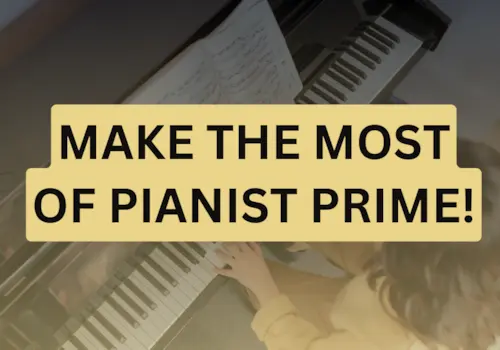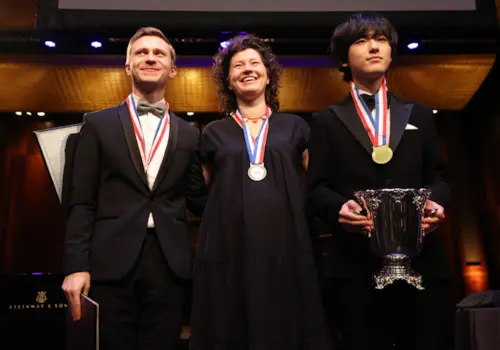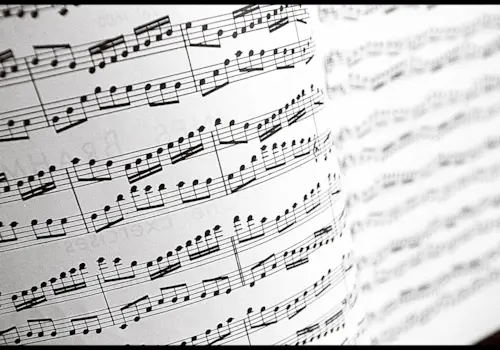Classical pianist & columnist Daniel Johnson highlights a selection of remarkable BBC Proms programmes from the last 100 years.
With the BBC Proms commencing this Friday 13th July, Daniel Johnson explores the popularity of the Piano Concerto in programmes, the quite extraordinary first Piano Recital in 1997, and the importance of the BBC Young Musician of the Year competition.
As the solo pianist walks out on to the stage - taking their place in the spotlight - the piano is sitting waiting to have a world of possibilities released from it.
For many of us, our training – whether at Music College or University – is always the same. We learn what is known as the ‘repertoire’, the classics. This might be learning the complete Chopin Etudes or the Grieg Piano Concerto, or eventually ending up knowing all the Beethoven Sonatas from memory in between developing our own unique style. There is something quite special about performing a Concerto and its popularity throughout history is only equalled by the fact that it is, aside from recitals, the vehicle for the soloist. A bravura display of virtuosity for the solo performer and a glamorous spectacle for the audience.
The unmoving presence of Rachmaninoff
Throughout the history of the Proms, there has always been a keen programming of Piano Concertos, and as I delved into the archives I discovered a whole heap of gems. The Proms first took place at the Royal Albert Hall in 1941 and were overseen – and have been ever since – by the BBC in 1942. The significance in these dates is not just the historical evolution of the festival, but because each ‘First Night of the Proms’ concerts featured works by the Russian master Rachmaninoff. His now standard work Rhapsody on a theme by Paganini was composed just seven years beforehand – in 1934 - and featured in the first Prom concert to take place at the RAH, with Cyril Smith as the soloist.
The Proms' first ever Piano Recital
Quite extraordinarily, the first Piano Recital at the Proms didn’t take place until 1997. Performed by Evgeny Kissin, it attracted the biggest audience the festival had seen since being established in 1895. Fittingly, this was a programme of Chopin, Liszt, Beethoven and Shubert. This year, Sir Andras Schiff will return to perform Book 2 of the Well-Tempered Clavier, concluding the cycle he began in 2017. This will be his 13th appearance at the Proms since 1976.
The importance of new commissions
With new commissions being a fundamental part of the programming, one of the most important was that of Benjamin Britten. The World premiere - at the 1938 Proms - was unusual as it didn’t follow his compositional output and he took centre stage himself as the soloist in the performance. Since its premiere it has been programmed 12 times, inclusive of the first performance, with Sir Henry Wood at the helm of the BBC Symphony Orchestra. For those who like to listen to historical recordings, this performance by Britten was discovered in 2015 and is now available at the British Library. In fact, Benjamin Grosvenor - who features twice this season with Gershwin’s Rhapsody in Blue and Mozart’s Piano Concerto No 21 - performed Britten’s Concerto back in 2011. Angela Hewitt and Inon Barnatan will also perform Gershwin this season, An American in Paris and Concerto in F. Newman and Wood programmed the popular with the new and explorative, introducing composers of the time to audiences; something which is exemplified today. Last year there was the World Premiere performance of Julian Anderson’s Piano Concerto.
Stay up to date with Daniel Johnson by following him on Twitter.
This year's programme celebrates the 40th Anniversary of BBC Young Musician of the Year
The Proms Co-Founder Wood was a great supporter of young musicians, so it is only fitting that this year there will be a Prom to celebrate the 40th Anniversary of the BBC competition. Three past piano winners, Lara Melda (2010) Freddy Kempf (1992) and Martin James Bartlett (2014) will feature. The latter made his Proms debut in 2015 with Rhapsody in Blue. Incidentally, Grosvenor, who is himself a winner of the BBC competition, made his debut with Liszt’s Second Piano Concerto in 2011.
Embracing new classical music genres into programming
Throughout the season we will have the chance to hear Grieg from Khatia Bunistishvili, Bernstein from Jean-Yves Thibaudet and Prokovifiev from Yuja Wang, Mendelsohn from Bertrand Chamayou, Bach from Uri Caine and Mozart from Francesco Piemontesi. These composers and their works - which one may refer to as ‘Stalwarts’ - are central in programming as they open up a world of music for many who may be listening to them for the first time.
With recent polls and research concluding there is something of a resurgence of 18 – 34-year-olds listening to classical music, the question is whether these ‘Stalwarts’ that have been part of the Proms programming will continue to be. There is evidence that these ‘new’ listeners have been engaged through the industry, acknowledging the development of movie music and Video Game Music - known as VGM – which itself demonstrates their understanding for the need for growth. I mention it here as quasi piano concertos feature throughout these genres and, quite feasibly, the Proms may see a change in the future with the inclusion of these works. Interestingly, the very first Prom featured an orchestral arrangement – the London premiere of Alexander Glazunov’s orchestration - of Chopin’s ‘military’ Polonaise, which demonstrates that even 100 years ago there was an appetite for popular melodies to be bought to audiences in a majestic fashion. So why not embrace new genres of classical music into the programming?
Does this mean Rachmaninov, Gershwin, Liszt, and Mozart will be forgotten? I doubt the classics will ever be left on the shelf away from the programming. Yes, the ‘World’s Greatest Classical Music Festival’ will develop and move with the times, but the message of its co-founders Newman and Wood will never be forgotten.
By Daniel Johnson. Daniel is British classical pianist and columnist.











